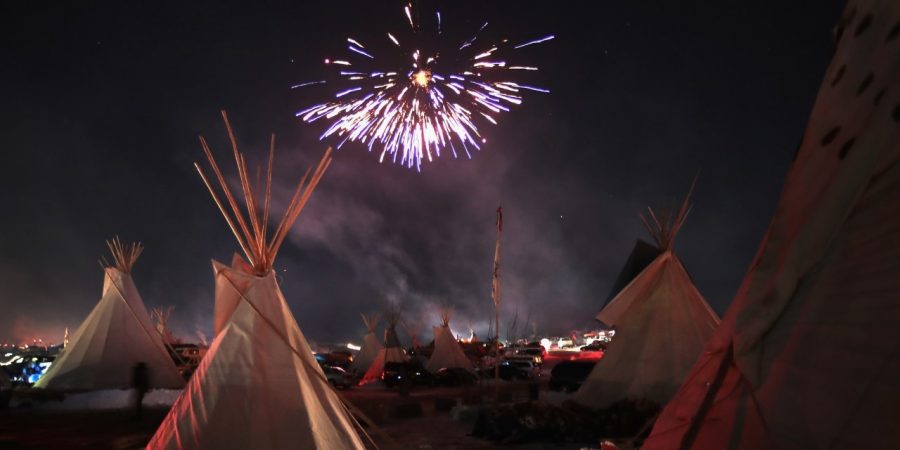Dakota Access Pipeline protesters have a major victory, for now
December 4, 2016
The Army Corps of Engineers announced on Sunday that the plans for the controversial Dakota Access oil pipeline to run under Lake Oahe, in North Dakota, will not be approved.
The decision is based on the need to fully investigate alternative routes. Protestors are celebratory but also aware that with the upcoming change in presidency, there is a possibility that the decision could be reversed.
The long-awaited news comes shortly after an organization, Veterans for Standing Rock, attracted tribe and non-tribe veterans to form an unarmed militia between law enforcement and Dakota Access Pipeline protestors, undeterred by the state issued evacuation deadline for the following day.
Tensions have run high the past few months resulting in several violent clashes between police and demonstrators. Morton County police have faced criticism over spraying a protest crowd with water cannons during freezing temperatures on November 20, resulting in the hospitalization of 17 people. Police argue that cannon use was in response to aggressive behavior, the need for crowd control, and to put out fires that activists started. The National Lawyers Guild filed a class-action suit on the behalf of victims against the police department for using excessive force. There have been reports that the militarized police presence has also used rubber bullets, tear gas and concussion grenades.
Michael Wood Jr., retired Baltimore officer and Marine veteran, is a cofounder for the event that invites the veterans to show their support. According to CNN, he is a proponent for police reform and the stories he’s heard from the protest site concerned him.
He told CNN, “if we don’t stand up for the oppressed, that’s the snowball that starts that leads to everyone else’s oppression”.
“It doesn’t matter if you are a libertarian, a conservative, or a progressive, this is everyone’s fight,” Wood said.
Last Monday, North Dakota Governor Jack Dalrymple issued an emergency evacuation order due to “harsh conditions” of the upcoming winter. Local law enforcement is imposing a fine for vehicle bringing supplies into the area, as well as fines for those who stay in the camp sites. However, many protestors have made it clear that they will stay as long as possible.
The Standing Rock Sioux tribe sued the U.S. Army Corps of Engineers for plans that would allow the pipeline to run under a lake. They assert that the pipeline will pose a danger for clean water, invade sacred sites, and is breaking a treaty with the Standing Rock Sioux tribe because there was not proper consultation for the project.
In September, the Departments of Justice, Interior, and the Army halted the construction for 20 miles around the site at issue to investigate that plans were made lawfully. Recently, President-elect Donald Trump has supported the finishing of the pipeline. It should be noted that he has stock in the Texas-based company that is in running the project, Energy Transfer Partners, as well as Phillips 66, a company that holds a large financial share of the pipeline. This has raised more concerns that he will face conflicts of interests as a president, although a Trump spokeswoman says his support is not based on personal interests but rather on his policies.
The protest attracted international attention, with United Nations representatives reproaching U.S. security forces’ tactics towards the pipeline protestors. Maini Kai, a human rights lawyer from Kenya and a U.N official, noted that though some protestors have resorted to violence, police force response has been disproportionate. Additionally, the police actions have harmed many who were exercising their rights peacefully, according to the Washington Post. Kai also condemned the way that those arrested were being detained, according to the Post, deeming it “inhumane and degrading.”
The North Dakota Veterans Coordinating Council wrote a letter to the Veterans for Standing Rock organizers opposing intervention at the protest camps because it believes it will cause more tension, according to ABC News. Council President Russ Stabler discouraged veterans to participate in a protest that has “broken laws, destroyed property and attacked law enforcement,” reports ABC.
Opponents of DAPL take the news for the pipeline to be rerouted as a sign that the peoples’ voices do matter.
After months of discouragement, there is hope for the Standing Rock Sioux again.




